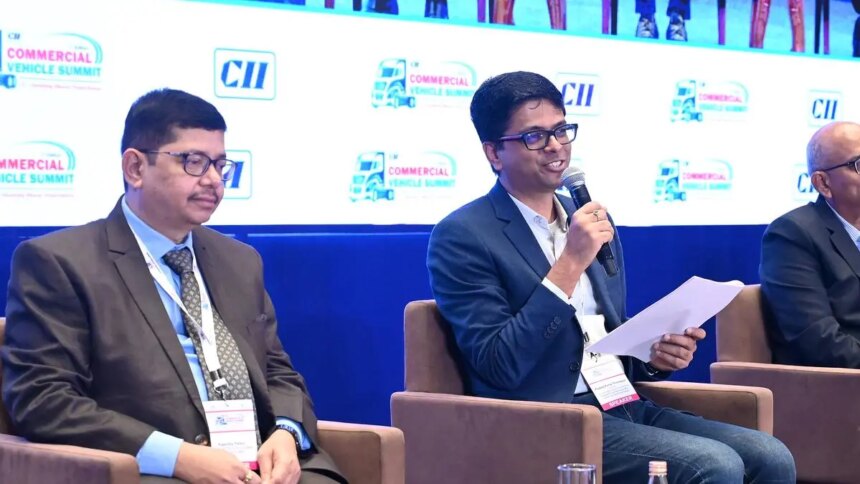
(From left) Rajendra Petkar, President and Chief Technology Officer, Tata Motors Ltd; Pradeep Kumar Thimmaiyan, Chairman, CII Commercial Vehicle Summit 2025; and P. Ravichandran, Deputy Chairman, CII (Southern Region), at the 3rd edition of the CII Commercial Vehicle Summit, held in Chennai on Friday, April 25, 2025.
| Photo Credit:
businessline/BIJOY GHOSH
The commercial vehicle (CV) industry in India is poised for a major transformation, spurred by technological advancements, shifting customer expectations, and the growing demand for sustainable practices, industry leaders said at the CII Commercial Vehicle Summit in Chennai today.
Over the past decade, the Indian CV industry has faced numerous challenges, including fluctuating economic cycles, the impact of the COVID-19 pandemic, commodity price volatility, liquidity issues, and evolving regulations. Despite these hurdles, key factors such as urbanization, increased public infrastructure investments, the boom in e-commerce, and favourable policy reforms have set the stage for a strong recovery.
Rajendra Petkar, President and Chief Technology Officer at Tata Motors Ltd., highlighted the industry’s resilience, noting that a stronger recovery has followed each downturn. “Historically, the Indian CV industry has shown remarkable adaptability, with each sales peak surpassing the previous one,” Petkar remarked.
The industry is now entering an era of rapid evolution, where real-time changes drive technological advancements that once took years to implement. Original Equipment Manufacturers (OEMs) are quickly adjusting their strategies to meet the evolving demands of the market. The introduction of zero-emission vehicles, particularly in the last-mile mobility segment, is a prime example of this shift.
Public transport and last-mile delivery electrification are gaining momentum, with OEMs investing significantly in emerging technologies such as hydrogen, flex fuels, and battery-electric vehicles. Petkar stressed the importance of road safety, pointing out that vehicle safety remains a top national priority with high road fatality rates.
The growth in electric vehicle (EV) sales is particularly promising. The government’s ambitious target of 30% fleet electrification by 2030 has energized the sector. However, P. Ravichandran, Deputy Chairman of CII (SR) and President of Danfoss Industries Pvt. Ltd., emphasized the need to accelerate this momentum. He pointed out that heavy-duty trucks make up just 3% of the fleet and contribute to nearly 40% of vehicular emissions. This highlights the urgent need for cleaner fuels, smarter mobility strategies, and more connected solutions.
Ravichandran also called for a holistic approach to decarbonizing mobility, stressing that it requires an integrated ecosystem that spans manufacturing, logistics, infrastructure, and regulation.
Pradeep Kumar Thimmaiyan, Chairman of the CII Commercial Vehicle Summit 2025 and President and Chief Technology Officer at Daimler India Commercial Vehicles, highlighted the increasing role of electronics in vehicles, which generate vast amounts of data. While this brings opportunities, it raises concerns around safety and cybersecurity, which OEMs must address to ensure vehicles are used safely.
Thimmaiyan also emphasised the critical role of drivers in India’s economy. “The CV industry is the backbone of our economy, and drivers are its lifeblood,” he said. “However, driving is no longer seen as an attractive profession, and it is our responsibility to improve the work environment for them.”
Published on April 25, 2025










